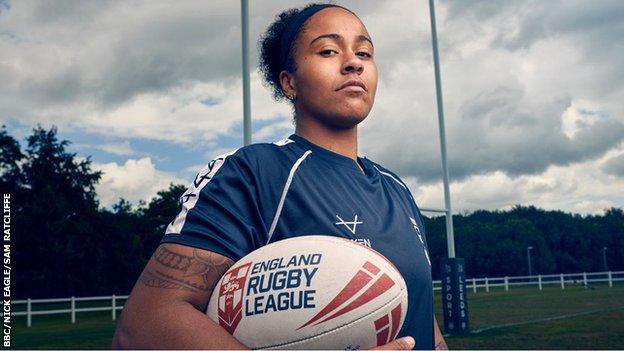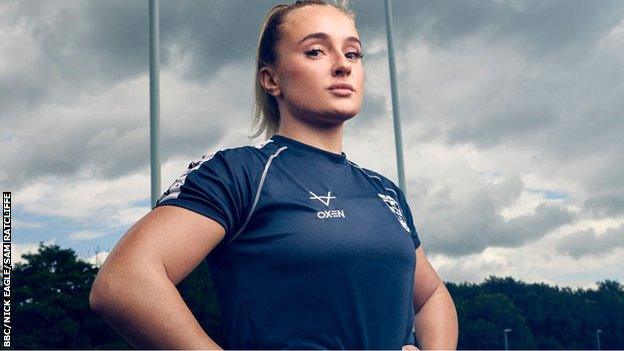A look inside the England Women's Rugby League camp
- Published
Women of Steel: Meet the England players ready to take on the world
Watch Women of Steel: on BBC iPlayer from Monday 24 October. Also on BBC Two, 21:30, Monday 31 October. |
Financial struggles, mental health and battles with body image are all explored in a fascinating new documentary that goes behind the scenes of the England Women's Rugby League team.
Women of Steel takes us into the England women's camp before the 2022 World Cup, as players battle to make selection - they don't receive a salary for rugby and so instead are playing for the pride of representing their country.
The film gives an intimate insight into the sacrifices that have to be made - the hours in the gym, balancing childcare and work, alongside battles with personal demons.
Here are just a few takeaways.
'I can't be moving fridges for the rest of my life' - the players dream of going professional
Because they don't receive a salary for playing rugby, the women in the England side work in a variety of different sectors.
Prop, Chantelle Crowl, 29, earns a living transporting refrigerators around the North West in a heavy goods vehicle (HGV).
"My truck's called Fiona. She's a rusty beaut," says Crowl.
It's a demanding job and she admits that "to be able to still perform on the pitch, in the gym is hard".

Chantelle 'Channy' Crowl is one of the biggest characters in the dressing room.
For her, to get paid to play rugby would be life-changing.
"Imagine being a full-time athlete, that would be the life," she says, adding, "That's what we all want. I can't be moving fridges for the rest of my life."
Beyond work, the women all have to fit England training and matches around commitments to their clubs.
England head coach, Craig Richards underlines the challenge.
"It's just about being mindful of the fact that I'm not dealing with full-time athletes that we can call on 24/7 and we can push to the limits that we'd perhaps like to," he says.
'I struggled with postnatal depression'
For Amy Hardcastle, 2022 is her third World Cup. The 33-year-old is England's leading-scorer and the only English player to be named in the National Rugby League team of the decade in 2020.
In the film, she reflects on a time 12 years ago with the birth of her daughter, Olivia.
Women of Steel: England rugby league star Amy Hardcastle shares her story
"I struggled with postnatal depression," she says. "Panic attacks occurred quite a lot. I went through a stage where my anxiety got really bad, but I didn't even know why I was being anxious.
"I got to a point where I couldn't even leave the house. Every time I got in my car, I felt like I had vertigo. Rugby league helped me get through that time."
Hardcastle now works with the charity Rugby League Cares, supporting delivery around mental health workshops.
Team-mate, Paige Travis, 21, calls her, "the mother hen," of the squad, saying, "She's my rugby mum. I need looking after."
Chantelle Crowl and Richards have 'love-hate relationship'
Richards calls Crowl an "absolutely fantastic person," and heaps praise on her abilities. However, he often seems frustrated by this mercurial talent.
Crowl was bullied at school and says she "owes everything to rugby".
"Channy's biggest challenge is that she doesn't understand her potential," says Richards in one scene, adding: "I keep telling her that - you do not know how good you are. She should be one of the number one forwards in the world."
Richards also says Crowl can be unpredictable.
"It's been a challenging four and a half years with Chantelle," he says.
"At times as a coach, you're almost on eggshells as to what she's going to do next. You're trying to look after her and keep her focussed. You only do that because you know what a great person she is."
For her part, Crowl says: "Me and Craig have got a little love-hate relationship going on. I don't ever want to disappoint him."
In one scene, however, she does get on the wrong side of Richards, when she fails to report to training after getting married. It jeopardises her place in the squad.
"If I selected the team with my heart, she'd probably be the captain," says Richard, adding, "It's not my job to select with my heart."
'I really struggled with body image for a long time' - players on strength training
Given the demands of the sport, players in the England camp need to be in peak physical condition.
For some, this has taken some getting used to. Travis speaks about working in the gym and developing muscle mass.

Paige Travis talks openly about body image
"I really struggled with body image for a long time - when I I saw changes to my body," she says.
"My shoulders became a lot bigger. I used to think I looked too manly. I felt like my dad in a dress. I've come round to it."
She explains that she has had comments from others to say that her arms are "massive".
"It used to really get to me. Now I'm like, 'yeah they are, because I play rugby league for my country'," she says.
Her match-day routine still includes some of her own beauty rituals.
"If I look good and I feel good, I'll play better," says Travis, adding, "My game prep - I like to do my hair a certain way, have my dinosaur plait. It helps me feel more confident."
Kelsey Gentles, 23, says: "There's no perfect body.
"This body lifts people in tackles, this body can run 100 metres in so many seconds. You've kind of just got to accept yourself and love yourself."
'He's just a cuddly teddy-bear' - coach Craig Richards is a big, scary, softie
Richards' role seems to incorporate not just coaching, but all kinds of pastoral care - from disciplinary chats to listening to personal problems.
"I used to be really scared of him," says Travis, adding, "He's just a cuddly teddy-bear really. He's been there in some tough times. He's a bit like a dad to us all."
Veteran squad member, Hardcastle concurs.
"I was right scared of Craig," she says.
"I was like, 'I don't like Craig, he doesn't talk.' Do you know what? I've learned so much about him. I see him as a father figure."